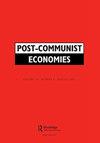加速发展地区:俄罗斯政策失败的又一案例?
IF 1.8
3区 经济学
Q2 ECONOMICS
引用次数: 2
摘要
加速发展区(TORs)1是一个经济特区,最初旨在推动俄罗斯远东地区的转型经济发展。他们很快也被允许在俄罗斯各地的mongoroda(一家公司的城镇)工作,从而降低了转型的期望。概念和执行的变化涉及一个复杂而矛盾的政策过程,通过对其进行分析,可以更广泛地得出关于俄罗斯政策过程性质的结论。本文章由计算机程序翻译,如有差异,请以英文原文为准。
Territories of accelerated development: another case of policy failure in Russia?
ABSTRACT Territories of accelerated development (TORs)1 are special economic zones originally devised to drive transformational economic development in the Russian Far East (RFE). They quickly came to be allowed also in monogoroda (one-company towns) throughout Russia, with reduced transformational expectations. The change in concept and implementation involved a complex and conflicted policy process, the analysis of which allows conclusions to be reached on the nature of the Russian policy process more broadly.
求助全文
通过发布文献求助,成功后即可免费获取论文全文。
去求助
来源期刊

Post-Communist Economies
ECONOMICS-
CiteScore
4.90
自引率
18.20%
发文量
21
期刊介绍:
Post-Communist Economies publishes key research and policy articles in the analysis of post-communist economies. The basic transformation in the past two decades through stabilisation, liberalisation and privatisation has been completed in virtually all of the former communist countries, but despite the dramatic changes that have taken place, the post-communist economies still form a clearly identifiable group, distinguished by the impact of the years of communist rule. Post-communist economies still present distinctive problems that make them a particular focus of research.
 求助内容:
求助内容: 应助结果提醒方式:
应助结果提醒方式:


